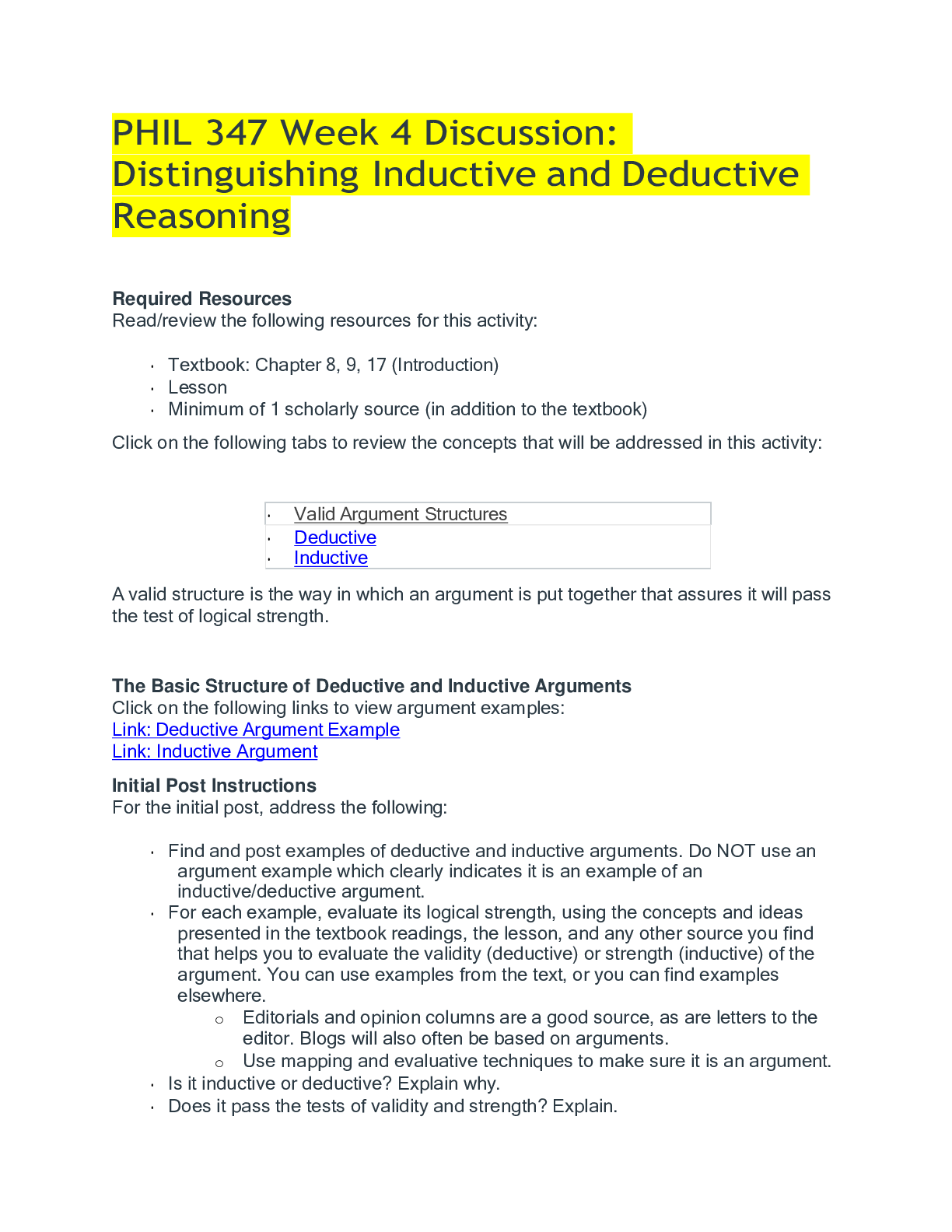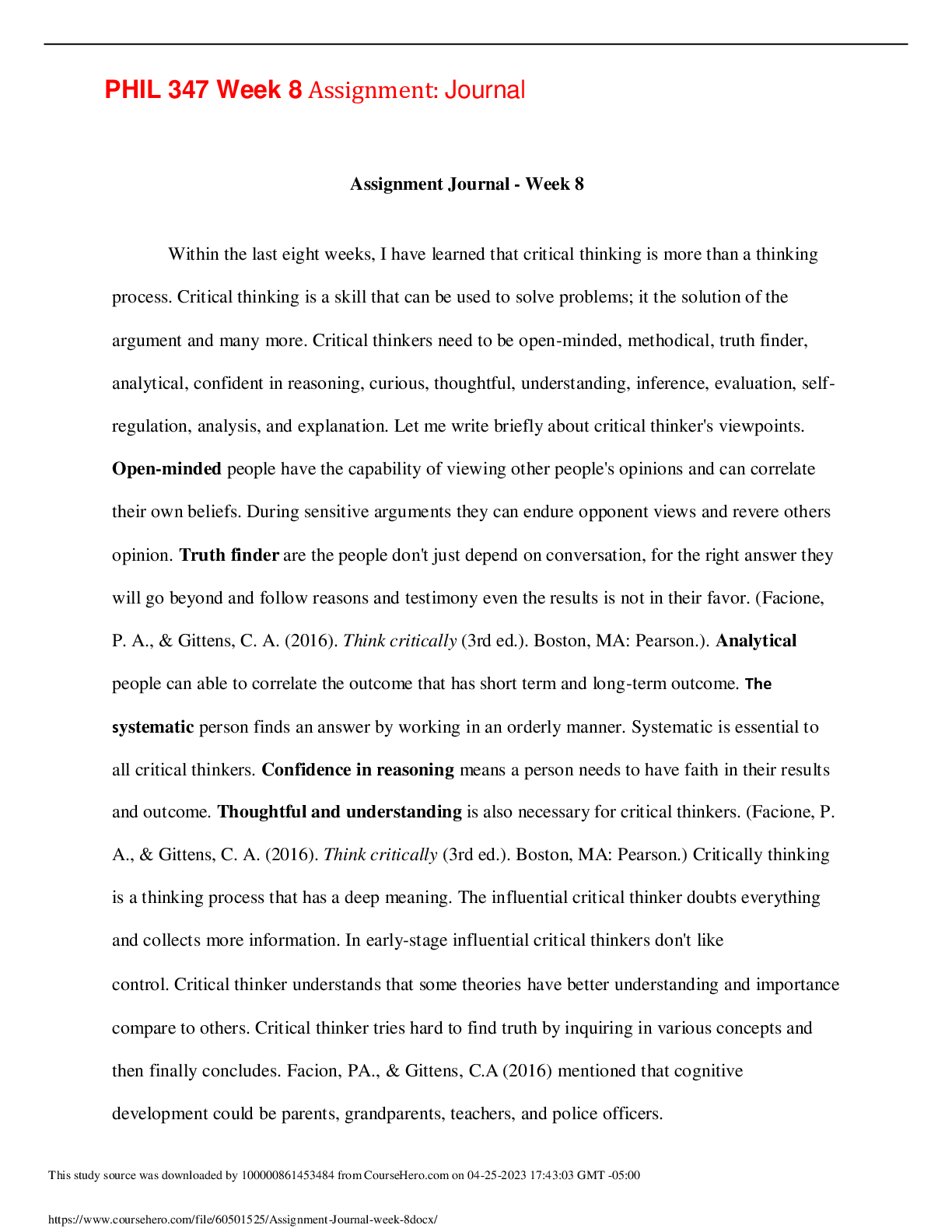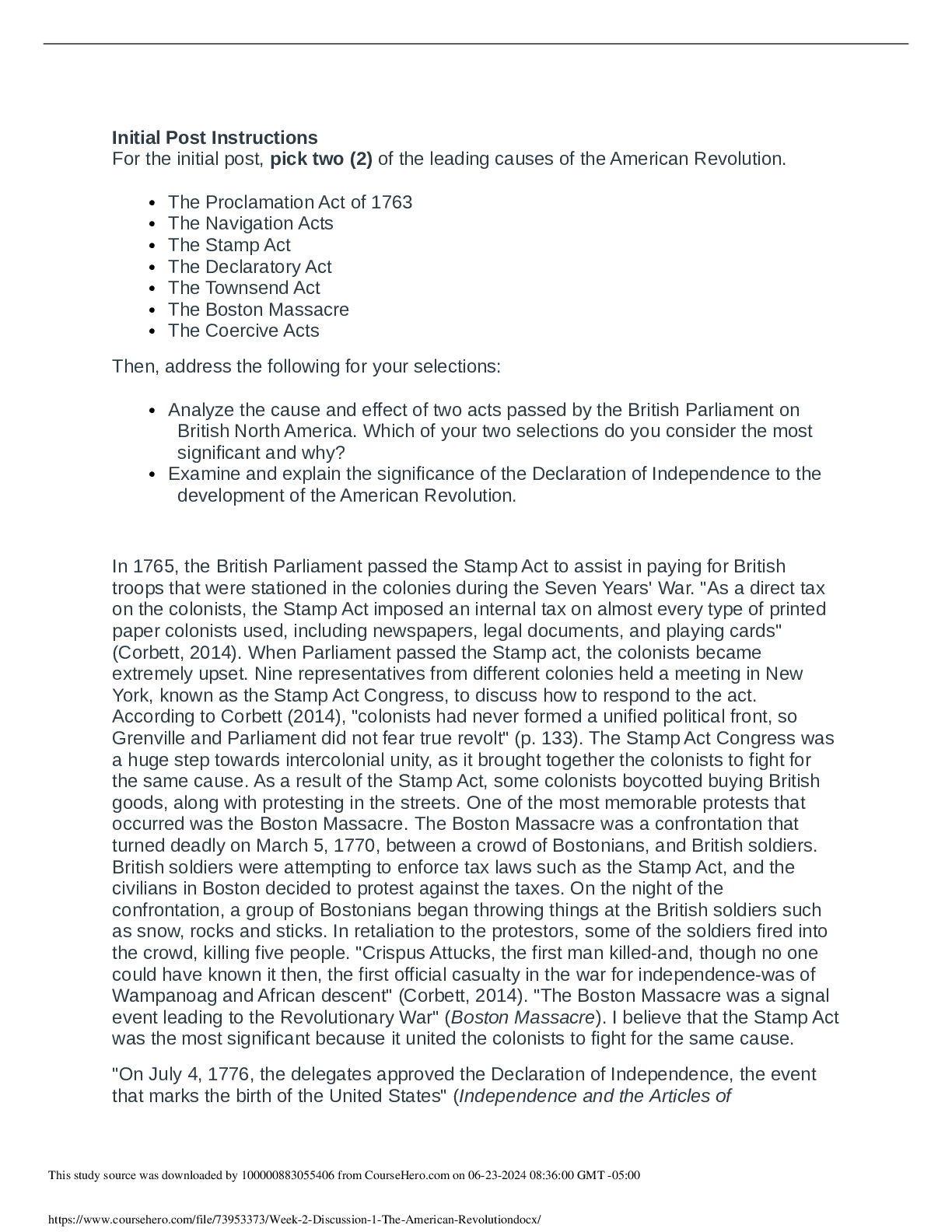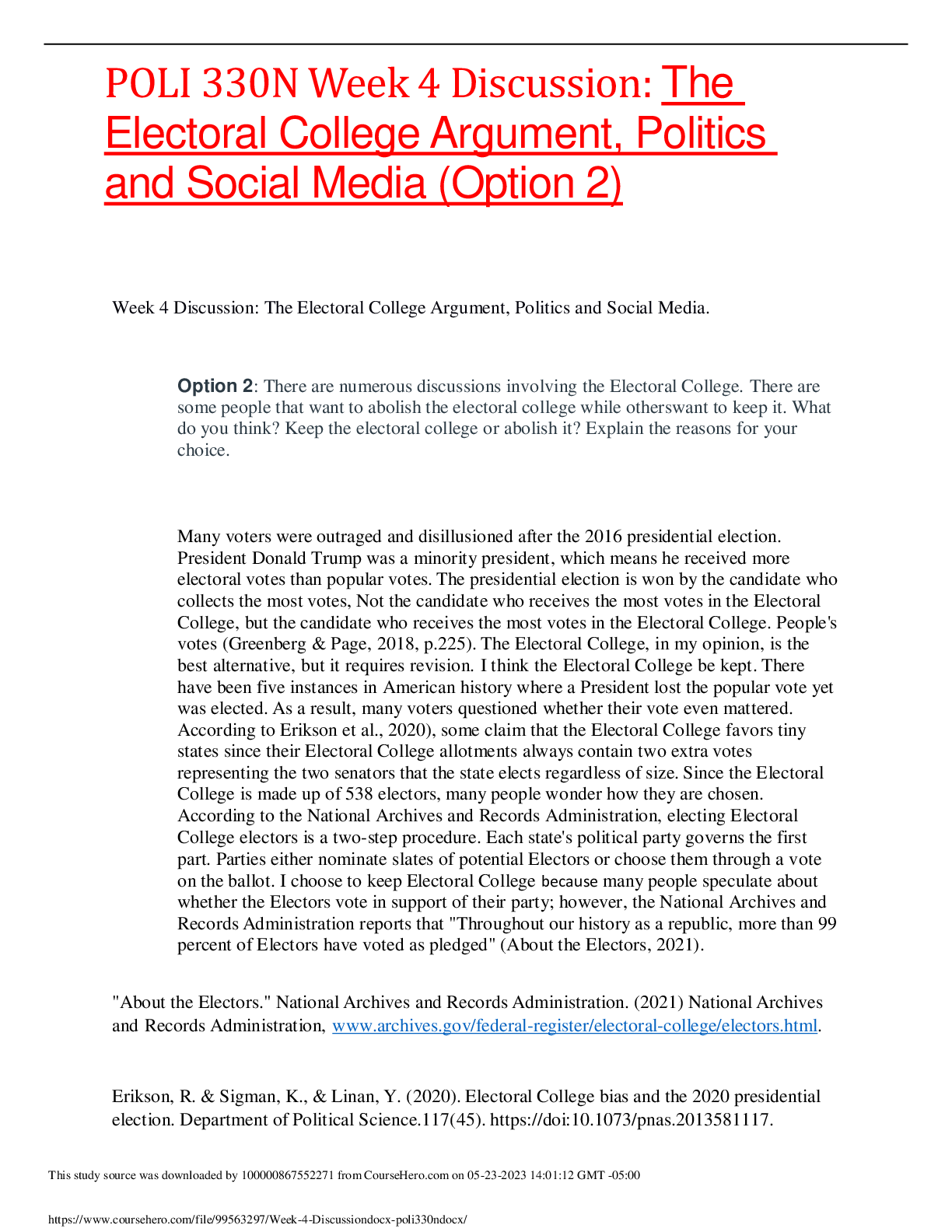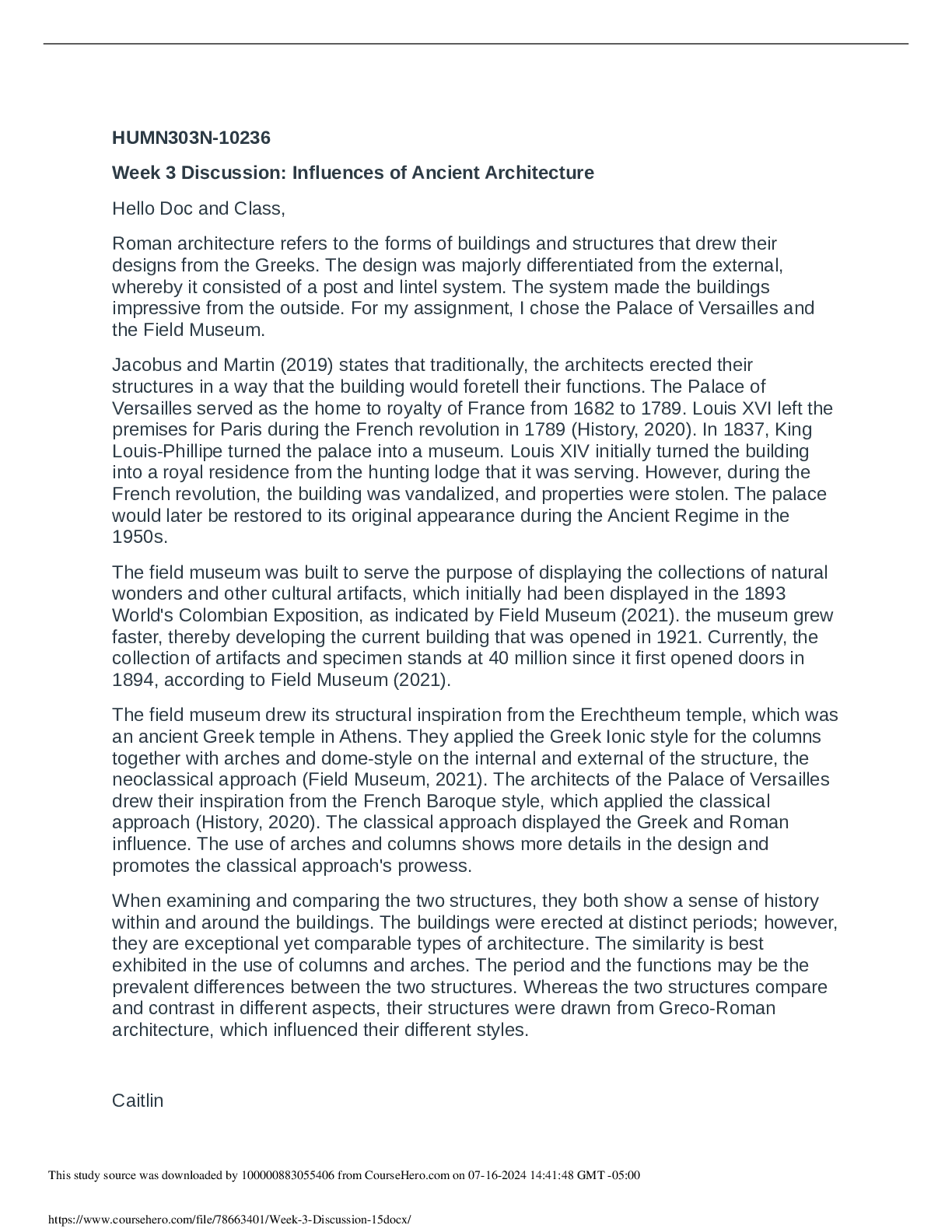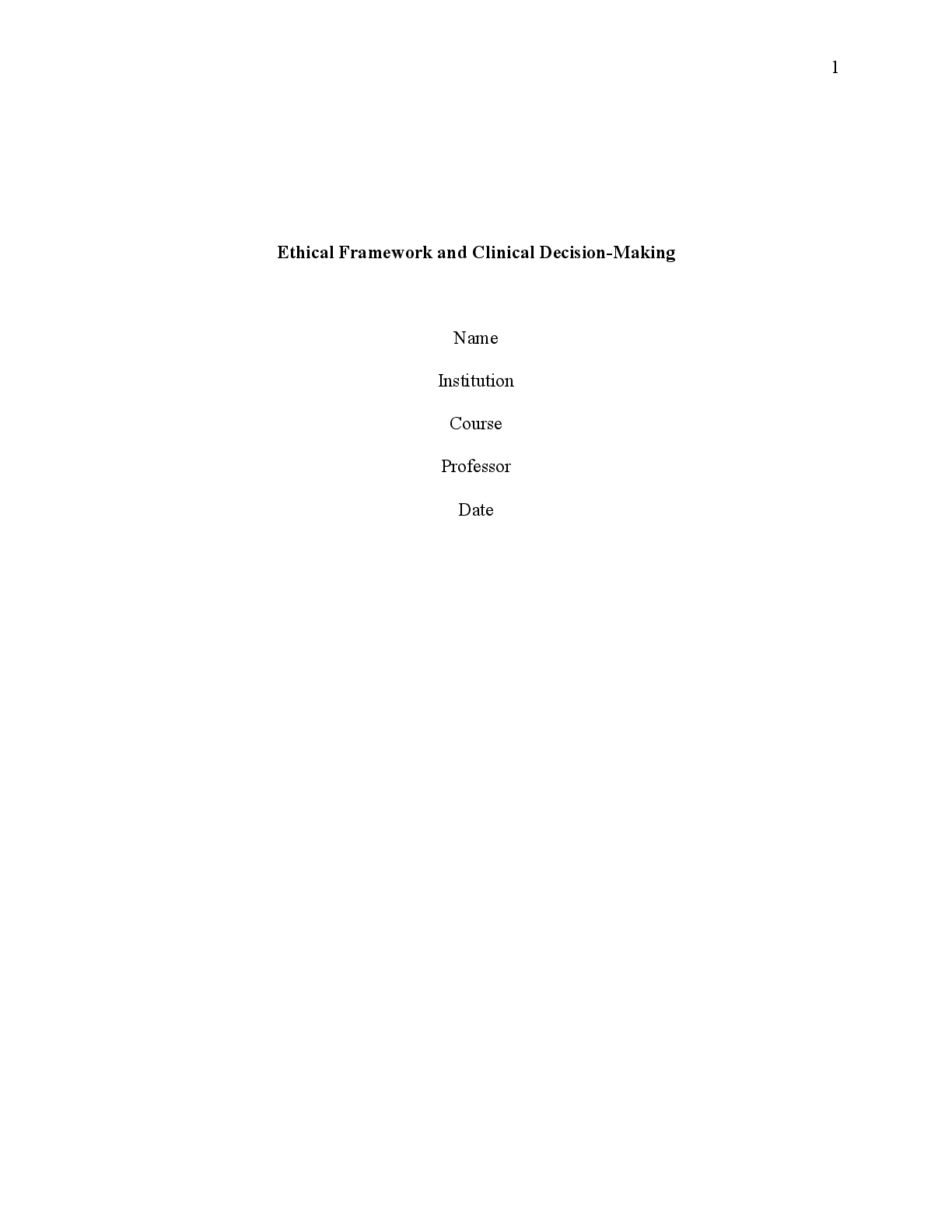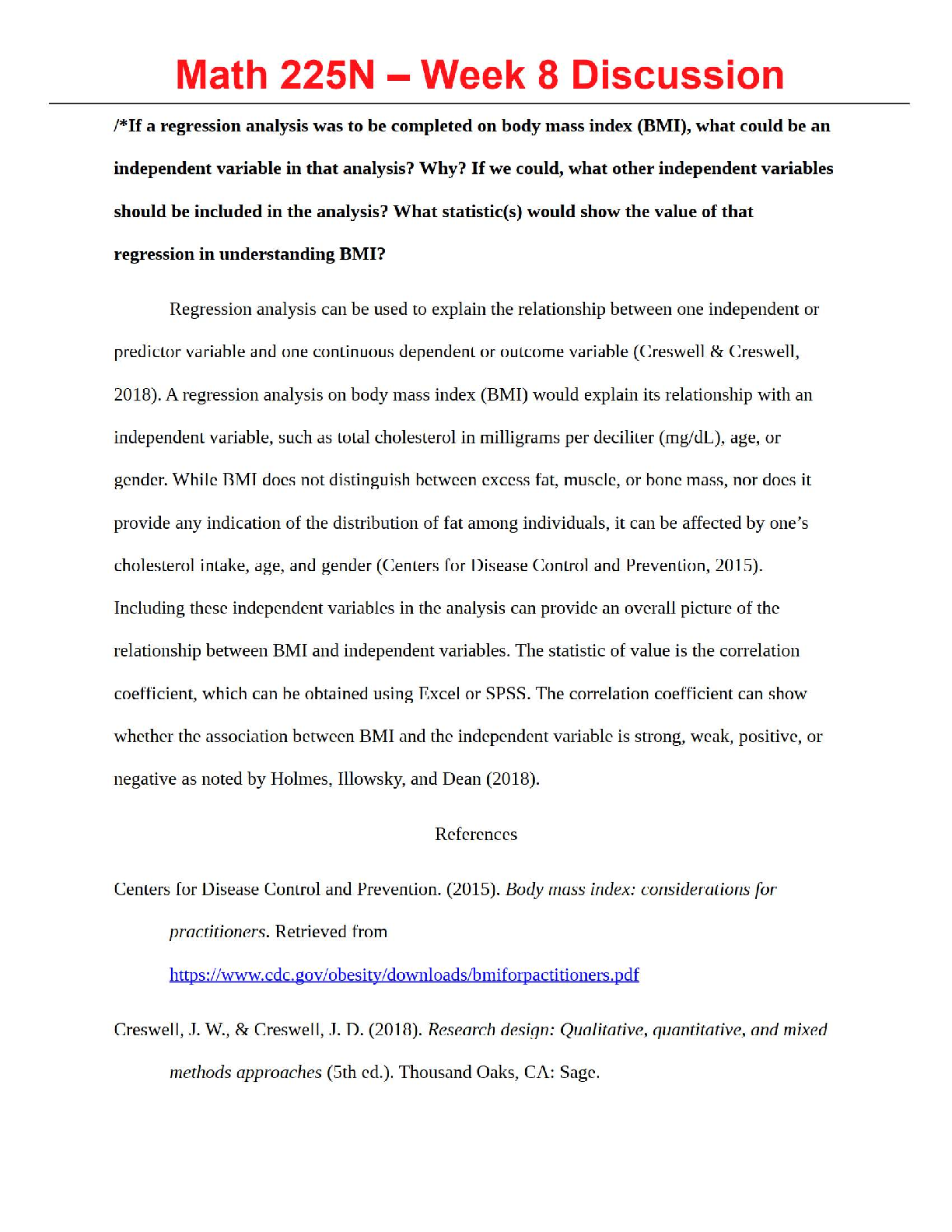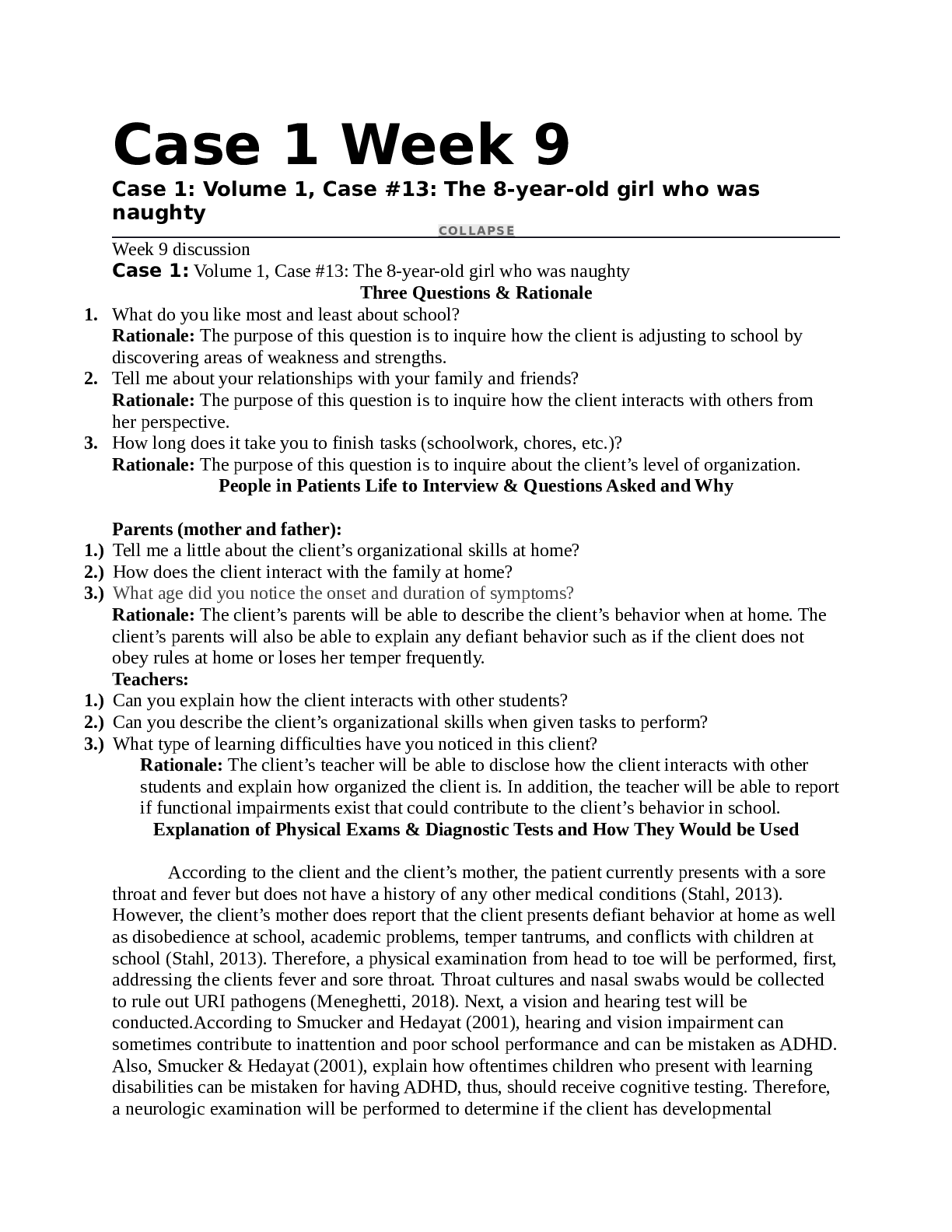Required Resources
Read/review the following resources for this activity:
• Textbook: Chapter 8, 9, 17 (Introduction)
• Lesson
• Minimum of 1 scholarly source (in addition to the textbook)
Click on the following t
...
Required Resources
Read/review the following resources for this activity:
• Textbook: Chapter 8, 9, 17 (Introduction)
• Lesson
• Minimum of 1 scholarly source (in addition to the textbook)
Click on the following tabs to review the concepts that will be addressed in this activity:
A valid structure is the way in which an argument is put together that assures it will pass the test of logical strength.
The Basic Structure of Deductive and Inductive Arguments
Click on the following links to view argument examples:
Link: Deductive Argument Example Link: Inductive Argument
Initial Post Instructions
For the initial post, address the following:
• Find and post examples of deductive and inductive arguments. Do NOT use an argument example which clearly indicates it is an example of an inductive/deductive argument.
• For each example, evaluate its logical strength, using the concepts and ideas presented in the textbook readings, the lesson, and any other source you find that helps you to evaluate the validity (deductive) or strength (inductive) of the argument. You can use examples from the text, or you can find examples elsewhere.
o Editorials and opinion columns are a good source, as are letters to the editor. Blogs will also often be based on arguments.
o Use mapping and evaluative techniques to make sure it is an argument.
• Is it inductive or deductive? Explain why.
• Does it pass the tests of validity and strength? Explain.
Follow-Up Post Instructions
Respond to at least one peer. Further the dialogue by providing more information and clarification. Do you agree with their analysis – be very specific about why you agree or disagree.
Writing Requirements
• Minimum of 2 posts (1 initial & 1 follow-up)
• Minimum of 2 sources cited (assigned readings/online lessons and an outside source)
• APA format for in-text citations and list of references
Grading
This activity will be graded using the Discussion Grading Rubric. Please review the following link:
• Link (webpage): Discussion Guidelines
Course Outcomes (CO): 3, 4
Due Date for Initial Post: By 11:59 p.m. MT Recommended by Wednesday Due Date for Follow-Up Posts: By 11:59 p.m. MT on Sunday
Posts must be on separate days.
Search entries or author Filter replies by unreadUnread Collapse replies Expand
replies
Subscribed
Collapse SubdiscussionJason Oakes
Jason Oakes
Apr 21, 2021Local: Apr 21 at 12:40am
Course: Apr 20 at 10:40pm
Manage Discussion Entry
And here we go with another week.
Over the years teaching this kind of material, I have come up with 2 words that I think are helpful when trying to understand and recognize the difference between inductive and deductive arguments.
Inductive = Probability
o
Collapse SubdiscussionMeryl McGowan
Meryl McGowan
May 26, 2021Local: May 26 at 6:49pm
Course: May 26 at 4:49pm
Manage Discussion Entry
Hey Professor and friends!
How do we believe something is true? Learning about inductive and deductive reasoning was quite a challenge, in fact each week keeps making me realize how much communication is such a bigger part of the world than I thought.
Inductive reasoning or probable arguments can be summarized as "although it does not yield certainty, inductive reasoning can provide a confident basis for solid belief in our conclusions and a reason-able basis for action" (Facione P., & Gittens, 2015). basically, several different examples of why the thought is true but never certain, only probable.
An example of inductive reasoning would be:
1. A chair in the dining room is velvet.
2. A chair in the bedroom is velvet.
Therefore, all the chairs in the house are probably velvet. An example if deductive reasoning would be:
1. All bunnies have fuzzy tails.
2. A cottontail is a breed of bunny. Therefore, all cottontails have fuzzy tails.
This is taking two true statements and draw a conclusion from them, this conclusion may not be true but the facts are true.
References
Betts, J. (n.d.). Deductive reasoning examples. Retrieved May 26, 2021, from https://examples.yourdictionary.com/deductive-reasoning- examples.html (Links to an external site.)
Facione, P. A., & Gittens, C. A. (2016). Think critically (3rd ed.). Boston: Pearson.
(1 like)
▪
Erjona Ulaj
Erjona Ulaj
May 28, 2021Local: May 28 at 3:08pm
Course: May 28 at 1:08pm
Manage Discussion Entry
Hi Meryl,
I enjoyed reading your post, I agree that learning inductive and deductive reasoning was a challenge. At first I would read about it and would feel as though I understood it; then I would mix up the definitions again. The examples were a huge help and your examples were great. With inductive argument it's important to use the word "probably" and for deductive it is important to use "therefore" or "so" which you did. Your deductive argument showed two true statements with a conclusion derived from them that may not be true. Excellent job!
▪
Nordia Maddis
Nordia Maddis
May 30, 2021Local: May 30 at 6:08am
Course: May 30 at 4:08am
Manage Discussion Entry
Hi Meryl,
I love your approach to deductive and inductive reasoning. Like you also had a hard time learning and comprehension of the definition was also hard for me but after thorough research and a lot of examples, I understood. According to (Facione & Gittenns 2016), reasoning skills are used when one draws conclusions from what they think is possibly true. I love that you used the word “probably” in your inductive argument as an inductive argument is based on what is probable or likely
▪
Danielle Diaz
Danielle Diaz
May 30, 2021Local: May 30 at 3:34pm
Course: May 30 at 1:34pm
Manage Discussion Entry
Hello Meryl,
I really did have a great time reading your post and agree with the fact that deductive and inductive reasoning is a difficult challenge, however it is rewarding to know. I also think the example from the text that you used was a perfect short explanation of the topic. The examples you also used for inductive/deductive reasoning were very well put and helped me understand the definition better.
Collapse SubdiscussionBousso Diop
Bousso Diop
May 24, 2021Local: May 24 at 6:42pm
Course: May 24 at 4:42pm
Manage Discussion Entry
Hello Everyone! I hope you are all well.
A deductive and inductive argument differ in structure and strength of conclusion (Moffat, 2014).
Deductive argument example:
P1: Susan is John’s younger sister. = True P2: Linda is John’s elder sister. = True
C: So, Linda is Susan’s elder sister. = Must necessarily True
For this example, note that the structure of the premises started from general principle: 'Susan is John’s younger sister' to infer a specific proposition, 'Linda is Susan’s elder sister'. And since the premises are true, the conclusion must be necessarily true; thus, a sound conclusion (Facione & Gittens, 2016). Also this is a valid argument because of the meaning of its relationship, in this case they are siblings. This argument passed the tests of validity and strength.
Inductive argument example:
P1: Anthony was at risk of dying from the severe fall that he took when he was climbing. = True
P2: Many who had the same near-fatal experience become averse to climbing afterward. =True
C: So, Anthony will surely become averse to climbing after his fall.
= Maybe True
As for the above example, note that the structure of an inductive reasoning started with a specific proposition: 'Anthony was at risk of dying from the severe fall that he took when he was climbing', to infer general principle, "So, Anthony will surely become averse to climbing after his fall". Though the premises are true, the conclusion is not strong because it can be either true or not. This argument passed the tests of validity and strength also.
References
Facione, P. A., & Gittens, C. A. (2016). Think critically (3rd ed.). Boston: Pearson.
Moffat, D. (2014, August 22). Deductive and Inductive Arguments [Video File]. Retrieved from: https://www.youtube.com/watch? time_continue=10&v=gQO7qhYSwvk&feature=emb_logo
o
Collapse SubdiscussionOluwasegun Olorunwa
Oluwasegun Olorunwa
May 26, 2021Local: May 26 at 9:22am
Course: May 26 at 7:22am
Manage Discussion Entry
Hi Bousso,
First, I have to commend you on your intelligent approach to this exercise. I carefully studied your work and I discovered that your inductive reasoning started with specific proposition. Here your conclusion says though the premises are true, the conclusion is nit strong enough because it can either true or not. In other
words, Anthony may likely become averse to climbing after his fall but the probability is not 100%. Good job Bousso.
▪
Bousso Diop
Bousso Diop
May 30, 2021Local: May 30 at 3:48pm
Course: May 30 at 1:48pm
Manage Discussion Entry
Hello Oluwasegun, Thank you for your feedback, I respect the fact that you are not totally agree with my conclusion. I left it vague on purpose for you (the class) to make your own judgement. Thank you!
o
Collapse SubdiscussionJason Oakes
Jason Oakes
May 26, 2021Local: May 26 at 10:06am
Course: May 26 at 8:06am
Manage Discussion Entry
Thanks for this Bousso, I really liked how you placed the T or F beside each premise and then labeled each conclusion as
= Must necessarily True and
= Maybe True
I prefer the word "probably" for inductive only because the stronger the argument the more likely that the conclusion will be true. Maybe suggests to me there is little relationship between the premises and conclusion. But this is just me being picky.
(1 like)
▪
Bousso Diop
Bousso Diop
May 30, 2021Local: May 30 at 3:54pm
Course: May 30 at 1:54pm
Manage Discussion Entry
Hello professor, thank you for your feedback, It draw my attention to be more specified next time. You called it being picky, I called it "helping us to deeper our critical thinking skills". (:
Thank you!
o
Collapse SubdiscussionKierra Woods
Kierra Woods
May 29, 2021Local: May 29 at 12:23am
Course: May 28 at 10:23pm
Manage Discussion Entry
Hi Bousso,
Great post and very detailed! I especially admired how you used the formulas and broke down each type of argument listing each premise as true and the conclusions as either "Must necessarily true" or "Maybe true" depending on the argument. This post actually helped me to understand the difference between Inductive and Deductive arguments more thoroughly.
(1 like)
▪
Bousso Diop
Bousso Diop
May 30, 2021Local: May 30 at 3:58pm
Course: May 30 at 1:58pm
Manage Discussion Entry
Hello Kierra, Thank you! I glad that the way I approached the subject helps you to deeper your understanding of these words. I believe that is the purpose of the discussion, learning from each other. Thanks again!
o
Ziare Davis
Ziare Davis
May 29, 2021Local: May 29 at 6:15pm
Course: May 29 at 4:15pm
Manage Discussion Entry
HEY BOUSSO !!
I love your examples you use for inductive and detective reasoning, you made two great simple examples. Also labeling the premises what's true or false. Thank god Anthony is okay, but P2 "Many who had the same near fatal experience become averse to climbing afterward" A lot of people might just still love climbing but will be more careful next time for climbing activities. Some people will be adverse to climbing to. But strong reasoning and understanding of deductive and inductive reasoning.
(1 like)
o
Collapse SubdiscussionFenisha Vice
Fenisha Vice
May 30, 2021Local: May 30 at 1:23pm
Course: May 30 at 11:23am
Manage Discussion Entry
Hi Bousso,
For me, distinguishing between the two types of reasoning can be tricky. I really enjoyed how you broke down everything to a level of understanding that made it more clear to decipher the differences between deductive and inductive reasoning. Thank you so much.
(1 like)
▪
Bousso Diop
Bousso Diop
May 30, 2021Local: May 30 at 4pm
Course: May 30 at 2pm
Manage Discussion Entry
You're welcome Fenisha, and thank you for taking your time to read my post!
o
Vida Quaye-Mingle
Vida Quaye-Mingle
May 30, 2021Local: May 30 at 10:33pm
Course: May 30 at 8:33pm
Manage Discussion Entry
hello Bussuo,
I must commend you for the beautifully written post. your post gave me a better understanding of this weeks concepts. you broke the material down and made it very easy to grasps.
o
Geralyn Leone
Geralyn Leone
May 31, 2021Local: May 31 at 12:22am
Course: May 30 at 10:22pm
Manage Discussion Entry
Hi Bousso,
Wonderful post. This week I struggled with the distinction between the different types of reasoning and arguments. You clearly defined the parts of your arguments and I found that helpful. Thank you!
Collapse SubdiscussionNatasha Yeboah
Natasha Yeboah
May 25, 2021Local: May 25 at 12:12am
Course: May 24 at 10:12pm
Manage Discussion Entry Hello Class,
Inductive argument:
"Anthony was at risk of dying from the severe fall that he took when he was climbing. Many who had the same near-fatal experience become averse to climbing afterward. So, Anthony will become averse to climbing after his fall" (Facione, 2016, p. 190).
This is an inductive argument because both of the premises are true and the conclusion is probably true, but is definitely not certain. I consider this to be an inductive generalization argument. Anthony is being compared to the other vast majority who experienced the same near-fatal accident, making a generalization that he will likely have the same outcome as they did. Both of these premises are true and they do make the conclusion more likely to be true, which makes this a strong argument. Because Anthony is being compared to many people who had the same experience as him, there is a greater chance that the conclusion is true. If Anthony was being compared to people that had a severe fall from walking down stairs, the conclusion would less likely be true- making it a weak argument.
Deductive argument:
All monkeys are bananas. My dog is a monkey. Therefore, my dog is a banana (Knachel, 2020).
This is an example of a deductive argument because both premises prove that the conclusion must be true. Because both of these premises guarantee the truth of the conclusion, this argument is valid. While this argument is valid, it surely is not sound. It is not considered sound because the premises are both false- monkeys are obviously really not bananas and my dog is obviously not actually a monkey.
References:
o
Jason Oakes
Jason Oakes
May 26, 2021Local: May 26 at 10:07am
Course: May 26 at 8:07am
Manage Discussion Entry
Thanks for this, well done getting this in early.
o
Milena Wlodkowska
Milena Wlodkowska
May 29, 2021Local: May 29 at 9:48am
Course: May 29 at 7:48am
Manage Discussion Entry
Hello Natasha,
The example of an inductive argument in the case of Antony’s risk of dying from severe falls is excellent and shows the relationship of the
premise and the conclusion quite clearly. While there is no empirical component in the study, the statement that “many who had the same near-fatal experience become averse to climbing afterwards” strongly supports the conclusion on why Antony will become averse to climbing after his fall. However, I am not convinced that there is a clear relationship between the first sentence of the statement and the last one because they trigger different conclusions about the experience.
Nonetheless it’s a good example of an inductive argument.
The example of deductive argument is straight forward and easy to relate. The relational statements are correct and the statements are declarative. Facione and Gittens (2016) underscore that inductive arguments are associated with applicated of generalizations within the premises. For instance, in the example there is an applied generalization that all monkeys are bananas which is not supported by any further evidence. Schechter (n.d) underscores that in deductive reasoning, the truth of input propositions logically guarantees the truth of outpur proposition. The only requirement is that the premises must have certainty and be affirmed. There should also be no mistake in the sequence of reasoning and the example affirms this component.
References:
Facione, P., & Gittens, C. A. (2016). Think critically. New York: Pearson Education, Inc.
Schechter, J. (n.d). Deductive Reasoning. Forthcoming in The Encyclopedia of the Mind, edited by Hal Pashler, SAGE Publishing. Retrieved from
https://www.brown.edu/academics/philosophy/sites/brown.edu.academ ics.philosophy/files/uploads/DeductiveReasoning.pdf.
o
Elisa Rodriguez
Elisa Rodriguez
May 30, 2021Local: May 30 at 1:30am
Course: May 29 at 11:30pm
Manage Discussion Entry
Hello Natasha,
You had great examples of helping distinguish the difference between deductive and inductive reasoning. Your description was clear and straight forwards. The examples alone for both helped me understand the significant difference between both types of reasonings. Personally reading and learning about these two reasonings I found was very interesting, and being able to get the opportunity to see everyone's perspective, examples, and explanations overall helped me understand the concept better. Thank you!
Collapse SubdiscussionTrish Vu
Trish Vu
May 25, 2021Local: May 25 at 11:05am
Course: May 25 at 9:05am
Manage Discussion Entry Hello Everyone,
My example of a deductive argument:
“Instead of adoration, I felt excessive apathy. I didn’t care for Romy at all. Hearing her aggressive howl mid-morning to be taken outside for a walk didn’t exactly motivate me to feel love and affection. Standing outside in the freezing cold every morning with a doggie bag in my hand while awaiting some fresh, warm animal poo didn’t give me a rush of excitement that an owner might feel. Quite frankly, Romy needed way too much attention, which I simply did not have enough to give. I was — and am — in a state of my life in which I would rather interact with real humans than play fetch with furry neighbors at the dog park. Romy required way too much work, and she stripped me of my independence" (Gallardo, 2018).
Gallardo, T. (2018, November 8). I Hate Dogs and I Am Not a Horrible Human Being. The Observer. https://fordhamobserver.com/36084/opinions/i-hate- dogs-and-i-am-not-a-horrible-human-being/.
Most people who own pet dogs are "dog people" and are an amazing human being.
Tatiana Gallardo has owned a dog but dislikes them.
Therefore, Tatiana is not a dog person and is a horrible human being.
o
Kula Kallon-Genfi
Kula Kallon-Genfi
May 30, 2021Local: May 30 at 11:47pm
Course: May 30 at 9:47pm
Manage Discussion Entry
Hello Trish,
I read your post and noticed how you differentiated inductive and deductive reasoning. We all know that inductive reasoning is based on developing a theory while deductive reasoning aims at testing an existing theory. Inductive reasoning moves from being specific to being
broad, meanwhile deductive reasoning is the total opposite. For this reason, we do not expect the conclusion to be wrong if the premise is true. This was a great discussion and it enabled us to think deeper and utilize our critical thinking skills.
Collapse SubdiscussionOluwasegun Olorunwa
Oluwasegun Olorunwa
May 25, 2021Local: May 25 at 1:05pm
Course: May 25 at 11:05am
Manage Discussion Entry
Professor and Class,
In deductive argument, it is the arguer that proclaims that their premises are true and therefore, the
conclusion must be accepted.
For example:
1. All Mangoes are fruits
2. All fruits grow on trees
Therefore, all mangoes grow on trees. Premises A & B are true because we can see physically see and witness this.
Inductive argument is based off the premises that the claim supports probable truth of the conclusion, so the conclusion should be accepted, as the conclusion is true.
For example:
“Officially 1,694,599 people have contracted the coronavirus to date, and 100,047 have died, according to data from Johns Hopkins University. The
U.S. death toll makes up nearly one-third of the total number of coronavirus- related deaths worldwide” (Lim, 2020). Updated info: The number of death still counting as at May 2021.
1. 100,047 people have died of Corona Virus in the United States
2. The United States death toll makes up nearly one-third of the world wide coronavirus deaths.
Therefore, the United States has grossly mishandled the coronavirus outbreak. Premises A & B show probability of being true as this was seen in news media.
Reference:
Lim, C. (2020, May 27). More Than 100,000 People Have Died Of The Coronavirus In The US.
Retrieved
o
Collapse SubdiscussionNatasha Yeboah
Natasha Yeboah
May 27, 2021Local: May 27 at 12:18am
Course: May 26 at 10:18pm
Manage Discussion Entry
Hello Oluwasegun,
I really enjoyed your opinion on explaining these types of arguments. the explanation for deductive argument was easier to understand as the it is the arguer that proclaims that their premises are true, it is also a process of reasoning from one or more statements to reach a logical conclusion. The examples give were very good. On the other hand, inductive argument is also used to collect instances of evidence of something specific to support a a general conclusion.
▪
Jason Oakes
Jason Oakes
May 27, 2021Local: May 27 at 5:49pm
Course: May 27 at 3:49pm
Manage Discussion Entry
Thanks gang, this is a good discussion getting started here. Well done.
Collapse SubdiscussionDestinie Garrity
Destinie Garrity
May 25, 2021Local: May 25 at 9:05pm
Course: May 25 at 7:05pm
Manage Discussion Entry Hello Professor and Class, Deductive Example:
The log is on the fire. Therefore, the log is not cold
It is not true both that the log is on the fire and the log is cold. The log is on the fire so the log is not cold.
=Watertight
Under deduction instructions, people judge whether the conclusion is necessarily true given the premises (Stephens et al., 2018). Our book explains that deductive reasoning moves with exacting precision from the assumed truth of a set of beliefs to a conclusion which cannot be false if those beliefs are true (Facione, 2016). In order to determine an argument to be valid it must be logical and clear-cut. Facione (2016) states deductive validity leaves no room for uncertainty unless one alters the meanings of words or the grammar of the language. If the assumption that all the premises are true it makes it impossible for the conclusion to be false. This example is a valid argument and passes the test of logical strength.
Inductive Example:
The bedroom is painted blue. The bathroom is painted blue. The living room is painted blue. All the rooms in the house are blue.
=Maybe True/ Probability
Under induction instructions, people judge whether the argument conclusion is plausible, strong, or likely to be true given the premises (Stephens et al., 2018). This example can be true or false and is not watertight. Unless we know for sure that all the rooms in the house are blue it is hard to validate this statement. The premises of this argument do not logically justify accepting conclusion as true.
o
Collapse SubdiscussionMeryl McGowan
Meryl McGowan
May 28, 2021Local: May 28 at 8:14pm
Course: May 28 at 6:14pm
Manage Discussion Entry
Hey Destinie,
From someone who struggled slightly with this weeks assignment, I appreciate your smaller and more simple examples. Being able to read others examples and see how they applied deductive and inductive reasoning, makes it slightly easier in my opinion. I agree with your analysis because your references are sound and well-defined.
Deductive, must be well defined and clear-cut, inductive = not really sure and needs more thought to be able to get a good conclusion.
Thank you! Meryl
(1 like)
▪
Destinie Garrity
Destinie Garrity
May 29, 2021Local: May 29 at 10:27pm
Course: May 29 at 8:27pm
Manage Discussion Entry
Hey Meryl,
Thank you for you post!
Appreciate the way you defined inductive and deductive as well.
Collapse SubdiscussionKamsi Udeh
Kamsi Udeh
May 26, 2021Local: May 26 at 11:13am
Course: May 26 at 9:13am
Manage Discussion Entry DISCUSSION WEEK 4
Hi everyone!
The idea of inductive reasoning is inferences justify the confident belief that their conclusion is very probably true given that their premises were all true (Facione, 2016). Facione (2016) says that inductive reasoning allows us to possess the scientific and medical knowledge to enable us to predict, diagnose, manage, and treat diseases. Although it does not yield certainty, it allows us to draw inferences about we think is true based on case studies, prior experience, and statistical analysis. For example, a man is found dead of a gunshot wound to his stomach and he is sitting at the base of a tree in the forest. We make observations that is deer hunting season, the man is dressed like a hunter, and his hunting rifle is lying by his side. This passes the logical strength test because if the reasons were true, then the conclusion would probably be very true which helps us evaluate the validity of this inductive argument. These premises are all true and leads us to draw the inference that his death resulted from a hunting accident.
Deductive reasoning involves a group of inferences that logically require that their conclusion must be true if all their premises are all true (Facione, 2016). Facione (2016) says deductive validity leaves no room for uncertainty. It moves with exact precision from the assumed truth of a set of beliefs to a conclusion which cannot be false if those beliefs are true (Facione,
2016). For example the premises consist of
o
Jason Oakes
Jason Oakes
May 27, 2021Local: May 27 at 5:49pm
Course: May 27 at 3:49pm
Manage Discussion Entry
Thanks Kamsi, do you think that on an average day you hear more inductive or deductive arguments? Why do you think you hear more than one than the other?
Christina Mekhail
Christina Mekhail
May 26, 2021Local: May 26 at 1:51pm
Course: May 26 at 11:51am
Manage Discussion Entry
Hello Professor and Classmates,
• Find and post examples of deductive and inductive arguments. Do NOT use an argument example which clearly indicates it is an example of an inductive/deductive argument.
An example of a deductive argument is “an argument that is intended by the arguer to be deductively valid, that is, to provide a guarantee of the truth of the conclusion provided that the argument’s premises are true” (Internet Encyclopedia of Philosophy). As stated in, “Deductive and Inductive Arguments,” by Internet Encyclopedia of Philosophy provides an example that a deductive argument states that, “It’s sunny in Singapore. If it’s sunny in Singapore, then he won’t be carrying an umbrella. So, he won’t be carrying an umbrella” (Internet Encyclopedia of Philosophy). Inductive arguments is “an argument that is intended by the arguer to be strong enough that, if the premises were to be true, then it would be unlikely that the conclusion is false” (Internet Encyclopedia of Philosophy).
The example involving inductive arguments states, “Every time I’ve walked by that dog, it hasn’t tried to bite me. So, the next time I walk by that dog it won’t try to bite me” (Internet Encyclopedia of Philosophy).
• For each example, evaluate its logical strength, using the concepts and ideas presented in the textbook readings, the lesson, and any other source you find that helps you to evaluate the validity (deductive) or strength (inductive) of the argument. You can use examples from the text, or you can find examples elsewhere.
◦ Editorials and opinion columns are a good source, as are letters to the editor. Blogs will also often be based on arguments.
◦ Use mapping and evaluative techniques to make sure it is an argument
There are many resources one can utilize when it comes to deductive and inductive arguments such as utilizing the textbook, looking at peer reviewed sites, and many other tools. As stated, blog posts are often used as great resources for arguments because it provides valid statements based off of opinions. Mapping and evaluating techniques to use in an deductive and/or inductive argument is key based on having an organized method of presenting your argument.
References:
Facione, P. A., & Gittens, C. A. (2016). Think critically (3rd ed.). Boston: Pearson.
Collapse SubdiscussionRamona Westberry
Ramona Westberry
May 26, 2021Local: May 26 at 2:02pm
Course: May 26 at 12:02pm
Manage Discussion Entry
Hello class,
Deductive example (March 10, 2021)
Some A are B. All C are B.
Therefore, all C are A.
Some mammals are swimmers. = true All whales are swimmers. = true
Therefore all whales are mammals. = must be true
If we did not have inductive reasoning we would not be able to explain or predict what would happen (Facione & Gittens, 2016).
Inductive example:
All dogs whine. = true
Maui whined all night. = true
Therefore Maui must be a dog. = may be true
In the deductive reasoning, the scenario was that some mammals are swimmers, that is true that some do swim. Then it states all whales are swimmers which is true, have you seen a walking whale? And the conclusion was all whales are mammals, that has to be true.
In inductive reasoning, there is a possibility you have to make your own conclusion or investigate further. The example says that all dogs whine that is true, that is communication for a dog. Then it goes onto say that Maui whined
o
Destinie Garrity
Destinie Garrity
May 27, 2021Local: May 27 at 7:58am
Course: May 27 at 5:58am
Manage Discussion Entry
Hi Ramona,
Great post! I really enjoyed your examples and explanations that followed. I agree with your inductive reasoning explanation that we need to make our own conclusion or investigate further. Under induction instructions, people judge whether the argument conclusion is plausible, strong, or likely to be true given the premises (Stephens et al., 2018). Considering your example I agree that we do not know for sure is Maui is indeed a dog, therefore the premises of this argument does not logically justify accepting the conclusion as true. Thank you for sharing!
Reference
Stephens, R. G., Dunn, J. C., & Hayes, B. K. (2018). Are there two processes in reasoning? The dimensionality of inductive and deductive inferences. Psychological Review, 125(2), 218–244. https://doi.org/10.1037/rev0000088
(1 like)
Collapse SubdiscussionCynthia Onuoha
Cynthia Onuoha
May 26, 2021Local: May 26 at 8:07pm
Course: May 26 at 6:07pm
Manage Discussion Entry Hello class
DEDUCTIVE ARGUMENTS
Deductive arguments are inferred to be valid. In deductive arguments, premises A and B are true, then the conclusion is true. Below is an example;
Premise a: Cynthia is ill
Premise B: If Cynthia is ill, then he wont be able to attend our meeting today. Premise C: Therefore, Cynthia will not be able to attend our meeting today.
This shows that sickness could validate why Cynthia was absent at the meeting today. It passes the test of validity because when someone is sick, they will experience tiredness and is always recommended to rest and that answers the question of her absence.
INDUCTIVE ARGUMENTS
In inductive argument, conclusions can be true or false. The argument is usually questionable. I will give an example below;
Premise A: Caroline is a grandmother. Premise B: Caroline loves oranges
Premise C: Therefore, all grandmothers loves oranges.
this argument could raise a lot of questions, even though Caroline could have been a grandmother and loves oranges, does it mean all grandmothers loves oranges?. the conclusion is often an assumption and always a probability.
References
"Deductive and Inductive Arguments | Internet Encyclopedia
of " https://iep.utm.edu/ded-ind/ (Links to an external site.). Accessed 26
May. 2021.
o
Ashli Marcelino
Ashli Marcelino
May 27, 2021Local: May 27 at 8:30am
Course: May 27 at 6:30am
Manage Discussion Entry
Hello Cynthia,
I liked how you explained each concept and then went on with your example. For deductive arguments it must be true that Cynthia will not be able to attend the meeting because she is ill. This explains the rule for when it comes to deductive arguments. Validity is deduced through deductive arguments. If premises A and B are true in a logical argument, the conclusion must also be true. Which is proven in your example. As for inductive argument, your example clearly states that just because one grandma likes oranges does not mean all grandmas love oranges. Conclusions in an inductive argument can be true or untrue. Usually, the argument is debatable. In your example it is debatable because who goes to say that some grandmothers aren't allergic to oranges, therefore not like them etc. Overall your examples were clear and easy to spot the differences.
o
Collapse SubdiscussionJason Oakes
Jason Oakes
May 27, 2021Local: May 27 at 5:51pm
Course: May 27 at 3:51pm
Manage Discussion Entry
Thanks Cynthia,
It is important to carefully distinguish between inductive and deductive arguments. For example, here is a clip I found on youtube once named "Inductive and Deductive Reasoning" but I am not sure if the person who posted this knew if this was an example of deductive or inductive reasoning or not? Perhaps they found examples of both in this short clip?
▪
Collapse SubdiscussionRamona Westberry
Ramona Westberry
May 28, 2021Local: May 28 at 10:27am
Course: May 28 at 8:27am
Manage Discussion Entry
Hello Professor,
I would have to say after watching this clip I found it to be deductive reasoning. What leads me to that conclusion is that Sherlock Holmes was giving numerous facts regarding the situation and the lady got upset about the accusations and threw wine onto him. This signaled that what he was saying was true and she didn't want to hear it or face facts.
▪
Jason Oakes
Jason Oakes
May 29, 2021Local: May 29 at 12:44am
Course: May 28 at 10:44pm
Manage Discussion Entry
Thanks for the comment Ramona.
The dialogue of the film was not meant to teach these things, but there is certainly some inductive reasoning here.
The light part of her finger makes is likely that she once had a ring on that hand which makes it likely that she was one married which makes it likely that she is no longer married.
Edited by Jason Oakes on May 29 at 12:46am
o
Christina Mekhail
Christina Mekhail
May 28, 2021Local: May 28 at 10:55pm
Course: May 28 at 8:55pm
Manage Discussion Entry
Hello Cynthia,
I felt that you really illustrated both inductive and deductive arguments very well! I also like how you provided examples for each argument!
First and foremost, deductive argument is “an argument that is intended by the arguer to be deductively valid, that is, to provide a guarantee of the truth of the conclusion provided that the argument’s premises are true” (Internet Encyclopedia of Philosophy). An inductive argument is “ Describing scientific investigations as inductive in character means that the conclusions reached are probabilistic.
Scientists would be the first to insist on this” (Gittens, pg. 285-286, 2016). Both examples you provided were valid and enjoyed reading
because they correlate towards the definitions. Cynthia, I felt that you illustrated both inductive and deductive arguments nicely and in an orderly manner. Excellent job!
References:
Facione, P. A., & Gittens, C. A. (2016). Think critically (3rd ed.). Boston: Pearson.
Internet Encyclopedia of Philosophy. Deductive and Inductive Arguments. (n.d.). https://iep.utm.edu/ded-ind/.
Collapse SubdiscussionKaren Edmonds
Karen Edmonds
May 26, 2021Local: May 26 at 9:53pm
Course: May 26 at 7:53pm
Manage Discussion Entry Hello Class,
An example of an inductive argument would be "Every windstorm in this area comes from the north. I can see a big cloud of dust in the distance. A new windstorm is coming from the north" (Examples of Inductive Reasoning 2020). An inductive argument is "one in which premises offer strong support for a conclusion, but one that is not certainty" ( The Difference Between Deductive and Inductive Reasoning in Arguments 2020). This is an argument in which the premises are supposed to support the conclusion or claim being made in a way that if the premises are true, it is unlikely that the conclusion would be false. Inductive reasoning borders on high probability, but that doesn't make it necessarily factual. On the other hand, deductive reasoning deals with an argument in which true premises guarantee a true conclusion. A deductive argument is an argument "that is intended by the arguer to be deductively valid, that is to provide a guarantee of the truth of the conclusion provided that the arguments premise are true" (Deductive and Inductive Arguments/Internet Encyclopedia of Philosophy 2020). An example of a deductive argument
would be "It's sunny in Singapore. If it's sunny in Singapore, then he won't be
o
Trish Vu
Trish Vu
May 29, 2021Local: May 29 at 6:18pm
Course: May 29 at 4:18pm
Manage Discussion Entry
Hi Karen,
In your example of "Every windstorm in this area comes from the north. I can see a big cloud of dust in the distance. A new windstorm is coming from the north" I find it agreeable that this statement would be an inductive argument.
It is because the author is giving the conclusion that since a big cloud of dust is approaching in the distance, it must originate from the north. This is based off the premise that every windstorm in the area has come from the north.
In your deductive argument, "It's sunny in Singapore. If it's sunny in Singapore, then he won't be carrying an umbrella. So, he won't be carrying an umbrella", the premise is the sunny weather allowing the person to not need to carry an umbrella.
Inductive argument : It is one in which the arguer attempts to demonstrate that the truth of the conclusion probably follows from the
premises. This is because the conclusion of an inductive argument is a projection based on the premises.
Deductive argument: It is one in which the arguer attempts to demonstrate that the truth of the conclusion necessarily follows from the premises. When a deductive argument is properly constructed, the premises logically entail the conclusion.
Facione, P. A., & Gittens, C. A. (2016). Think critically (3rd ed.). Boston: Pearson.
Collapse SubdiscussionMavis Appiah
Mavis Appiah
May 26, 2021Local: May 26 at 11:04pm
Course: May 26 at 9:04pm
Manage Discussion Entry
A deductive argument is one that has logical support and absolute conclusion (valid). If an argument is having true premises, then the argument is said to be sound. An inductive argument has conclusions that may be false although with premises that are true. (Bradford,2017).
Example of deductive argument
"All men are mortal. Harold is a man. Therefore, Harold is mortal." (Bradford, 2017) )
From the above statement, it is assumed that the two premises, "All men are mortal" and "Harold is a man" are true. From our text, a deductive argument that relies on true premises is ironclad, it is the strongest of all arguments, valid and with supported facts (Chamberlain, n.d.)
Example of inductive argument
“The coin that I pulled from bag is a penny, therefore all the coins in my bag are pennies” (Bradford,2017)
It is possible that all the premises are true in the above statement, however the conclusion will be false. Inductive arguments need to have strength and proof for its conclusions to be true. We can make assumptions from inductive arguments but unwarranted assumptions lead to erroneous generalizations (Facione & Gittens, 2016).
References
o
Cynthia Onuoha
Cynthia Onuoha
May 27, 2021Local: May 27 at 5:39pm
Course: May 27 at 3:39pm
Manage Discussion Entry
Hi Mavis.
I loved your explanations an examples, it made deductive and inductive arguments clear and understandable. I agree with you on both arguments. In inductive argument, making a conclusion that because the first, second, third and even forth penny that was picked out meant that the rest of the money in the bag were all pennies explained wholesomely inductive arguments, they are always a probability and a mere conclusion that has the potential of being false. Good job Mavis.
o
Jason Oakes
Jason Oakes
May 27, 2021Local: May 27 at 5:53pm
Course: May 27 at 3:53pm
Manage Discussion Entry
Thanks Mavis,
Here is your example of an inductive argument:
-
"The coin I pulled from the bag is a penny. That coin is a penny. A third coin from the bag is a penny. Therefore, all the coins in the bag are pennies."
-
That is an attempt at a deductive argument due to the conclusion being universal (all the coins are pennies) but it does not work so it needs to be an inductive argument. The conclusion works if it is changed to "all the coins in the bag are likely pennies" or "the next coin will probably be a penny".
In this example, another philosophical issue comes up.
How many pennies in a row would it take for my conclusion to move from "the next coin will probably be a penny" to "the next coin will almost certainly be a penny?" 100? 1000? 10,000?
It reminds me of this philosophical paradox:
R
Kula Kallon-Genfi
Kula Kallon-Genfi
May 26, 2021Local: May 26 at 11:35pm
Course: May 26 at 9:35pm
Manage Discussion Entry Hello Class,
Deductive reasoning usually follows steps. First, there is a premise, then a
second premise, and finally an inference. A common form of deductive
Ashli Marcelino
Ashli Marcelino
May 26, 2021Local: May 26 at 11:50pm
Course: May 26 at 9:50pm
Manage Discussion Entry Hello Everyone,
Examples of Deductive Arguments:
P1: All cats have a sharp sense of smell. P2: Fluffy is a cat
Conclusion: Therefore Fluffy must have a sharp sense of smell
Collapse SubdiscussionShedly Jean-Noel
Shedly Jean-Noel
May 27, 2021Local: May 27 at 2:48am
Course: May 27 at 12:48am
Manage Discussion Entry
Hello Everyone!
A deductive argument is an argument that draws a conclusion due to the premises being true (Indeed, 2020).
My example of a deductive argument:
1) Dereck is a monogamous relationship with Jane.
2) Jane has multiple partners and she has Chlamydia.
3) Dereck now has chlamydia because Jane gave it to him.
This conclusion of Dereck getting chlamydia because of Jane is very likely to be true, therefore since all the premises are true that makes the conclusion to be true (Facione & Gittens, 2016).
An inductive argument is an argument that even if the premises are proving to be true, but the generalization of the conclusion does not support the premises (IEP. 2021)
My example of an inductive argument is:
1) Patricia stated: "All men cheat"
2) Peter is her new boyfriend.
3) Therefore, Peter is a cheater.
This argument, from Patricia, is an indicative argument because although Peter is a man, that necessarily means that Peter is a cheater.
References:
Facione, P. A., & Gittens, C. A. (2016). Think critically (3rd ed.). Boston: Pearson.
IEP, Staff. (2021). Deductive and Inductive
Arguments. https://iep.utm.edu/ded-ind/#:~:text=An%20inductive
%20argument%20is%20an,degree%2C%20unlike%20with%20deductive
%20arguments (Links to an external site.).
Indeed, Editorial Team. (2021). Deductive Reasoning: Definition and Examples. https://www.indeed.com/career-advice/career- development/deductive-reasoning (Links to an external site.)
o
Jason Oakes
Jason Oakes
May 29, 2021Local: May 29 at 12:47am
Course: May 28 at 10:47pm
Manage Discussion Entry
Thanks for this contribution. Well done Shedly.
(1 like)
o
Kamsi Udeh
Kamsi Udeh
May 30, 2021Local: May 30 at 9:39am
Course: May 30 at 7:39am
Manage Discussion Entry
Hi Shedly,
Great post! The example of the inductive argument contains the fallacy of generalizations. Facione (2016) says at times we make erroneous generalizations based on far too little information. The premises may be true, however, the conclusion goes unjustifiably beyond what those premises could support. It may be true that all men cheat and that Peter is Patricia's new boyfriend. However, the conclusion that Peter is a cheater springs from preconceptions about men. In this particular case, this fallacy is presented as a warranted argument.
References:
Facione, P. A., & Gittens, C. A. (2016). Think critically (3rd ed.). Boston: Pearson.
(1 like)
o
Daniela Mendoza
Daniela Mendoza
May 30, 2021Local: May 30 at 7:40pm
Course: May 30 at 5:40pm
Manage Discussion Entry
Hi Shedly!
I think your post is great. It definitely made me LOL. I enjoyed reading this because this is so true in today's culture. I liked how you used men cheating as an inductive argument. Just because she got a new boyfriend does not mean that he is a cheater. He could be one of the good ones hahaha. We often forget that these still exist LOL.
Nordia Maddis
Nordia Maddis
May 27, 2021Local: May 27 at 2:31pm
Course: May 27 at 12:31pm
Manage Discussion Entry Hello everyone,
Here are instances of deductive and inductive reasoning I took from opinion articles
Inductive argument
"The economy isn't driven by stock prices or corporate profits — it only works because of workers. If they're doing well, the economy is doing well" (Linden, 2020).
The argument is that if workers are doing well, the economy at the same time is doing well. The initial premise is corporate profits or stock prices do not drive the economy. The other one is that the economy only works due to workers. According to (Facione & Gittenns 2016), reasoning skills are used when one draws conclusions from what they think is possibly true. The
statement is an inductive argument as it is possibly true that workers drive the economy and not corporate profits and stock prices but not for sure. The statement would require more solid proof to show that the claim is true. In my view, this argument does not have a strong validity.
Deductive argument
"Amazon is making a killing from this crisis. Almost literally. Jeff Bezos's net worth has grown by more than $24 billion since the crisis started since everyone is at home trying to avoid going to the store and ordering everything online" (Cummings 2020)
The claim is that Amazon is making a killing from the crisis. The first premise is that the net worth of Jeff Benzo has increased by at least $24 billion from when the crisis began. The other premise is that people at home are evading going store shopping and ordering online. (Facione & Gittenns 2016) discuss how people use deductive reasoning to suppose the truth of a series of beliefs to a conclusion that cannot be untrue if the beliefs are true. The statement is an instance of deductive reasoning. If it true that the worth of Jeff Benzo has grown by at least $24 billion and everyone is ordering online, then it is true that Amazon is making a killing from the crisis. In my view, the argument has strong validity as the article gives the exact amount Jeff Benzo's account has grown by, and many people are likely evading going to the store with the fear of contracting the Corona Virus.
References
Cummings, R. (2020, May 6). The Amazon Warehouse Was Grinding Me Down. Then The Coronavirus Arrived. BuzzFeed
News. https://www.buzzfeednews.com/article/rinacummings/amazon- warehouse-was-grinding-me-down-then-coronavirus (Links to an external site.)
Facione, P. A., & Gittens, C. A. (2016). Think critically (3rd ed.). Boston: Pearson.
Linden, M. (2020, April 10). Coronavirus: This Is What The Economy Looks Like Without Workers. BuzzFeed
News. https://www.buzzfeednews.com/article/michaellinden/coronavirus- shows-us-workers-are-the-economy (Links to an external site.)
Erjona Ulaj
Erjona Ulaj
May 27, 2021Local: May 27 at 3:54pm
Course: May 27 at 1:54pm
Manage Discussion Entry
Hello Professor and classmates!
"In deductive arguments, the speaker asserts that her premises are true and, therefore, her conclusion must be accepted..." (Facione, 2016). An example of deductive argument is below.
Deductive:
All women are able to cook and clean Kelly is a woman
Therefore, she is able to cook clean.
Explanation: This is a deductive argument; the speaker claims "all women are able to cook and clean" so because the speaker claimed this, it means the conclusion states that their premises is in fact true. The conclusion is "therefore, she is able to cook and clean" which is referring to the character named Kelly. This is two true statements and to form a conclusion derived from them, this conclusion might not be true/correct but the facts are true.
"In inductive arguments, the speaker presents evidence that she claims support the probable truth of her conclusion – that her conclusion is the most likely true – and so you should accept it" (Facione, 2016).
Inductive:
1. Most doctors have a God complex
2. Dr. Snoop is a doctor
Therefore Dr. Snoop has a God complex.
Explanation: This is generalizing "most" doctors to have a God complex, then it says Dr. Snoop is a doctor so Dr. Snoop has a God complex. A person making a statement like this could have dealt with several doctors who felt like they were better than everyone else, so now they present their evidence to support the probable claim that Dr. Snoop has a God complex. Meaning doctors probably have a God complex.
Reference:
Facione, P. A., & Gittens, C. A. (2016). Think critically (3rd ed.). Boston: Pearson.
Jason Oakes
Jason Oakes
May 27, 2021Local: May 27 at 5:55pm
Course: May 27 at 3:55pm
Manage Discussion Entry
A. Key Words
I like to make examples of inductive reasoning very clear by adding words like "probably" or "likely"
So this conclusion
The sun would shine tomorrow. can be turned into
The sun mostly likely will shine tomorrow
B. Another video to explain the difference
Here is another review of the differences between deductive and inductive reasoning
Dhruvi Patel
Dhruvi Patel
May 27, 2021Local: May 27 at 10:19pm
Course: May 27 at 8:19pm
Manage Discussion Entry
Kierra Woods
May 27, 2021Local: May 27 at 10:36pm
Course: May 27 at 8:36pm
Manage Discussion Entry Hi Everyone,
A deductive argument is an argument that is intended by the arguer to be deductively valid, that is, to provide a guarantee of the truth of the conclusion provided that the argument’s premises are true. (What is deductive argument in logic) The premises in a deductive argument are so strong that it would be impossible for the conclusion to be anything but true.
An example of a deductive argument:
o
Junsang Um
Junsang Um
May 30, 2021Local: May 30 at 2:15am
Course: May 30 at 12:15am
Manage Discussion Entry
Hi Kierra,
I liked how you have explained your deductive and inductive arguments. Approach for an inductive argument example is something that I haven’t thought about, but it still works perfectly. I agree that the premises in a deductive argument are strong and true that if all premises are true, then the conclusion must be true. On the other hand, the premises in the inductive argument can be true, but it also can be false, therefore, the conclusion may be definitive, but may not be true as well. I enjoyed reading your post and your examples. Thank you!
o
Karen Edmonds
Karen Edmonds
May 30, 2021Local: May 30 at 1:21pm
Course: May 30 at 11:21am
Manage Discussion Entry
Hi Kierra,
Great post! I like the way you explained the difference between deductive and inductive arguments. At first I wasn't sure how I felt about the two, but after reading everyone's thought process, I understood the terms clearly.
A deductive argument is an argument "that is intended by the arguer to be deductively valid, that is to provide a guarantee of the truth of the conclusion provided that the arguments premise are true" (Deductive and Inductive Arguments/Internet Encyclopedia of Philosophy 2020).
An inductive argument is "one in which premises offer strong support for a conclusion, but one that is not certainty" ( The Difference Between Deductive and Inductive Reasoning in Arguments 2020).
I like the examples you chose for your post. They are simple and straight forward and easy to understand.
Great Post! Karen
Collapse SubdiscussionMilena Wlodkowska
Milena Wlodkowska
May 28, 2021Local: May 28 at 10:46am
Course: May 28 at 8:46am
Manage Discussion Entry
Deductive Argument Example
“Government policies and laws that destroy the family unit are bad. The family is sacred, and it is fundamental to our American way of life. That is why I oppose the constitutional amendment, which would rip a family apart by deporting a parent, or even a child, if the person is not in this country legally” (Facione & Gittens, 2016, p.264).
The statement is an ideological argument that is largely deductive. The statement can be considered deductive for the following reasons. Firstly, the reasoning is accompanied with declarative statements such as “the family is sacred” and the “government policies and laws that destroy the family unit are bad.” The first premise in the statement is that families are sacred and fundamental to the American way of life, and should be protected. If the families are not sacred and need no protection, then the government policies that ‘rip’ families apart by deporting a parent a child would not be bad.
Considering that the conclusions of the ideological argument are presented as certaintiers, the statement qualifies as a deductive argument.
Inductive Argument
“Not all Americans participate in elections: In 2016, only around 61% of voting-age citizens cast a ballot. And those who do vote may not like the (often-binary) choices on their ballot – or agree with their candidate on all the issues” (Dimock, 2020).
o
Collapse SubdiscussionJason Oakes
Jason Oakes
May 30, 2021Local: May 30 at 10:23am
Course: May 30 at 8:23am
Manage Discussion Entry
Thanks for this, Milena.
Here is a handy chart a student from an earlier section of this class found that I thought was helpful.
▪
Dhruvi Patel
Dhruvi Patel
May 30, 2021Local: May 30 at 10:01pm
Course: May 30 at 8:01pm
Manage Discussion Entry
Hey Milena and Professor,
Thank you for your post, I really enjoyed reading your post. You provided great examples of deductive and inductive arguments and explained why the example is inductive or deductive argument, your explanation made it easier to understand why you gave that specific example. Moreover, Professor Oakes provided a great chart that gives general information on both reasoning which makes it more easier for everyone to understand, specially for those who is still confused about it.
The chart is perfect as it separated both reasoning from each other and it provides definition and how to we can identify an argument as inductive or deductive step by step and at the end it also gave examples as well.
Collapse SubdiscussionIndia Whitfield
India Whitfield
May 28, 2021Local: May 28 at 11:08am
Course: May 28 at 9:08am
Manage Discussion Entry
According to the text book, Inductive reasoning can provide a confident basis for solid belief in our conclusions and a reason-able basis for action, while deductive validity leaves no room for uncertainty, unless one alters the meanings of words or the grammar of the language" (Facione, 2016).
Inductive Example
"The coin I pulled from the bag is a penny. That coin is a penny. A third coin from the bag is a penny. Therefore, all the coins in the bag are pennies" (Bradford, 2018).
The issues is the all the coins being picked out the bag are pennies. The claim is that all the coins in the bag are pennies. The argument/ premise is that since the first and third coin picked out the bag are pennies then all of the coins in the bag are pennies.
According to the textbook, “We use inductive reasoning skills when we draw inferences about what we think is probably true based on analogies, case studies, prior experience, statistical analyses, simulations, hypotheticals, and patterns recognized in familiar objects, events, experiences, and behaviors. ” (Facione, 2016, pg 176).
This can be considered inductive reasoning because it is possible that all the coins in the bag are pennies but this is not based on a fact, so even if the premises in the statement is true, the inductive reasoning makes it false.
Deductive Example
“"All men are mortal. Harold is a man. Therefore, Harold is mortal" (Bradford, 2018).
According to the textbook, deductive reasoning is “exacting precision from the assumed truth of a set of beliefs to a conclusion which cannot be false if those beliefs are true. ” (Facione, 2016, pg 156).
The assumption made is that all man are mortal. The premise is that since Harold is a man, so he must be mortal. Because the premises of "All men are mortal" and "Harold is a man" are true, then the conclusion is logical and true.
References:
Bradford, A. (2018). Deductive Reasoning vs. Inductive Reasoning. Livescience. https://www.livescience.com/21569-deduction-vs- induction.html#:~:text=For%20example%2C%20%22All%20men%20are,is
%20a%20man%22%20are%20true.
Facione, P., & Gittens, C. A. (2016) Think Critically, (3rd edition). Pearson Education, Inc.
(1 like)
o
Lena Saniri
Lena Saniri
May 30, 2021Local: May 30 at 7:10pm
Course: May 30 at 5:10pm
Manage Discussion Entry
Hello India,
I see although we used the same source for our example, we used a different way of providing an understanding of the examples we used. So it is easy to say that I agree with the examples you given for inductive and deductive arguments. To add to the discussion, in chapter 5 truth-functional arguments are deductive arguments containing truth-functional claims. Truth-functional conjunction is “any conjunction formed with an operator asserting that both conjuncts are true" (Facione & Gittens, 2016). Furthermore, there are five types of truth-functional claims, and it is based on truth-functional logic. The first types are Simple claims, negations, conjunctions, disjunction, and conditionals (Facione & Gittens, 2016).
References:
Facione, P., & Gittens, C. A. (2016) Think Critically, (3rd edition). Pearson Education, Inc.
Elisa Rodriguez
Elisa Rodriguez
May 28, 2021Local: May 28 at 12pm
Course: May 28 at 10am
Manage Discussion Entry Hello Professor and Class,
I found Learning about Inductive and Deductive reasoning was very interesting. It helped me realize how two different approaches influence how we come to perceive if something is true. Students come to be aware of the mutual relationship between theory and research when they consider the relationships between the two in inductive and deductive approaches
(DeCarlo, 2018). With both Deductive and Inductive reasoning, the theory is
Fenisha Vice
Fenisha Vice
May 28, 2021Local: May 28 at 12:29pm
Course: May 28 at 10:29am
Manage Discussion Entry
The core idea here is this: A large, important and quite diverse group of inferences justify the confident belief that their conclusion is very probably true given that their premises are all true (Facione, 2016). An inductive argument or statement is not proven to be true, but all clues lead to a probable conclusion that supports that statement.
The suspect has a history of drug abuse. He has no alibi for the time of the murder. The suspect owns a collection of ceremonial knives and the murder weapon was a ceremonial knife. The suspect may have no motive as far as we know right now, but remember that his father was a serial killer. We found fibers at the crime scene, which are consistent with the brand of blue jeans the suspect wears. An eye witness places the suspect at the Fairfield Mall just one hour before the murder. So the suspect must be guilty (Facione 2016, p. 190).
All the facts presented in the above paragraph could easily lead the suspect being the killer. However, it has not been proven that he is, in fact, the killer.
Deductive reasoning is built on two statements whose logical relationship should lead to a third statement that is an unquestionably correct conclusion
All raccoons are omnivores. This animal is a raccoon.
This animal is an omnivore. (Learning 2021)
The above argument is deductive because the fact presented show evidence that supports the statement. The shirts would be printed by College Insignias if they have a lower price. College Insignias proved to have a lower price, therefore, the team chose to allow College Insignias to print the shirts.
This argument is deductive because an important group of inferences logically require that their conclusion must be true if their premises are all true (Facione 2016).
References
Facione, P. A., & Gittens, C. A. (2016). Think critically. Pearson.
Learning, L. (n.d.). 2021. Inductive and Deductive Reasoning. Inductive and Deductive Reasoning | English Composition I. https://www.kellogg.edu/upload/eng151text/chapter/text-inductive- reasoning/index.html.
Collapse SubdiscussionZiare Davis
Ziare Davis
May 28, 2021Local: May 28 at 11:53pm
Course: May 28 at 9:53pm
Manage Discussion Entry
What's up class!!
The difference between inductive and deductive reasoning is that Inductive reasoning aims at developing a theory while deductive reasoning aims at testing an existing theory (Streefkerk, 2019).
Deductive Example
A. All dog owners put there dog on a raw food diet
B. All pet dogs in my apartment building on a raw food diet
C. Ask dog owners if they feed there dog raw meat, 10 out of 20 dogs receive a raw food diet
Deductive reasoning is a basic form of valid reasoning (Bradford ,2018) , when you're doing a deductive research, always start with a theory. No theory no deductive reasoning. Analyze results my numbers (data) prove that reject hypothesis not all dogs eat raw food.
Inductive Example
A. Every time Susan eats lobster.
B. Susan face swells up.
C. Susan is allergic to Lobster.
Inductive reasoning is a type of reasoning that involves drawing a general conclusion from a set of specific observation (Masterclass, 2021) its possible observing a symptom after someone eating. Its a possibility Susan is allergic to lobster.
Reference:
Doyle, A. (2020, July 5). What Is Deductive Reasoning? The Balance
Careers. https://www.thebalancecareers.com/deductive-reasoning-definition-with- examples-2063749 (Links to an external site.)
Doyle, A. (2020, June 26). What Is Inductive Reasoning? The Balance Careers. https://www.thebalancecareers.com/inductive-reasoning-definition-with-examples- 2059683.
o
Mavis Appiah
Mavis Appiah
May 30, 2021Local: May 30 at 12:25pm
Course: May 30 at 10:25am
Manage Discussion Entry
Hello Zaire,
I like your explanation of a deductive and inductive argument and the examples you have used makes a clear distinction between the two. From your example, we can see that the conclusion "Ask dog owners if they feed their dog raw meat, 10 out of 20 dogs receive a raw food diet " is actually based on a valid or logical conclusion. A deductive argument must also be based on true premises, in your example "B. All pet dogs in my apartment building on a raw food diet" does not justify the conclusion. I completely agree with you on the example on inductive argument; the premises may be true but may not justify the conclusion. The conclusion may either be true or false since the premises may supply some form of evidence which can lead to generalization but not the truth of the conclusion.
Collapse SubdiscussionVida Quaye-Mingle
Vida Quaye-Mingle
May 29, 2021Local: May 29 at 1:43am
Course: May 28 at 11:43pm
Manage Discussion Entry hello class,
An inductive argument is an argument for which the premises are offered to provide probable but not conclusive support for its conclusions.(Facione P., & Gittens, 2016)
example,
o
India Whitfield
India Whitfield
May 31, 2021Local: May 31 at 1:07am
Course: May 30 at 11:07pm
Manage Discussion Entry
Hello,
Great post, I like how you were able to simplify the meaning of deductive and inductive meaning with examples that are easy to connect. The examples are a great way of understanding how inductive means that these claims can or may not happen because there is no actual fact. When the claim of its cloudy today is used, we do not know for sure it will rain. So the next claim of it will rain today is probable because it may or may not happen due to not being a fact.
While we can see when describing deductive, the example of knowing that Jane is pregnant, we know the next claim of Jane having a baby is an fact and therefore deductive.
Collapse SubdiscussionDanielle Diaz
Danielle Diaz
May 29, 2021Local: May 29 at 4:51pm
Course: May 29 at 2:51pm
Manage Discussion Entry Hello Everyone,
Deductive argument example:
- It's sunny in Florida.
- If it's sunny in Florida, then I won't be carrying an umbrella.
- So, I won't be carrying an umbrella
In this argument the conclusion follows the word "So". The two premises of the argument would, if it was true would make certain the conclusion. We wouldn't be able to examine if the argument is deductively sound unless we could determine whether both premises are true. We don't know whether it's one or the other. It won't change the fact that the argument is legitimate if it turns out to have a wrong premise and hence is unsound.
Inductive Argument Example:
- Today, Phil said he loves Crystal.
- So, Phil loves Crystal today.
In this argument an inductive argument is one in which the arguer intends for the premises to be true and the conclusion to be unlikely to be wrong if the premises are true. Its strength or success is a matter of degree. An inductive argument can also be affected by getting new evidence or "premises". This does pass the test of validity and it is a reasonably strong inductive argument,
o
Danielle Diaz
Danielle Diaz
May 29, 2021Local: May 29 at 4:51pm
Course: May 29 at 2:51pm
Manage Discussion Entry
Reference:
Facione, P. A., & Gittens, C. A. (2016). Think critically (3rd ed.). Boston: Pearson.
Lena Saniri
Lena Saniri
May 29, 2021Local: May 29 at 5:03pm
Course: May 29 at 3:03pm
Manage Discussion Entry Hello peers and Professor!
Below I have provided examples of deductive and inductive arguments by using the concepts and ideas presented in the textbook readings, the lesson, and other sources that I found to be helpful for me to evaluate the validity (deductive) or strength (inductive) of the argument.
According to the University of California State, “Deductive reasoning is a basic form of valid reasoning. Deductive reasoning, or deduction, starts out with a general statement, or hypothesis, and examines the possibilities to reach a specific, logical conclusion” (Bradford, 2017).
Example of inductive arguments.
"The coin I pulled from the bag is a penny. That coin is a penny. A third coin from the bag is a penny. Therefore, all the coins in the bag are
pennies." (Bradford, 2017).
Why is this inductive argument?
Inductive reasoning makes broad generalizations from specific observations. Basically, there is data, then conclusions are drawn from the data (Bradford, 2017).
Does it pass the tests of validity and strength? Explain.
Yes, the statement passes the test of validity and strength because inductive reasoning skills can be used when we draw inferences about what we think is probably true based on analogies, case studies, prior experience, statistical analyses, simulations, hypotheticals, and patterns recognized in familiar objects, events, experiences, and behaviors. Although the conclusion might be mistaken even though the evidence at hand is unchanged, the reasoning is inductive. Nonetheless, there is no certainty in Inductive reasoning, it can provide confident belief in the conclusions and reasonable claim for action (Facione & Gittens, 2016).
Example of a deductive argument
"All men are mortal. Harold is a man. Therefore, Harold is mortal" (Bradford, 2017).
Why is this deductive argument?
This is a deductive argument because for deductive reasoning to be sound, the hypothesis must be correct.
Does it pass the tests of validity and strength? Explain.
This passes the test of validity and strength because uses syllogism to test deductive reasoning to make sure the argument is valid (Bradford, 2017).
References
Bradford, A. (2017). Deductive Reasoning vs. Inductive Reasoning. Retrieved from Live Science: https://www.livescience.com/21569-deduction-vs- induction.html
Facione, P., & Gittens, C. A. (2016). Think Critically (Third ed.). United States of America: Pearson Education, Inc.
Collapse SubdiscussionDaniela Mendoza
Daniela Mendoza
May 29, 2021Local: May 29 at 7:17pm
Course: May 29 at 5:17pm
Manage Discussion Entry Hello class and professor!
This week we learned about deductive and inductive reasoning. I found this topic very interesting, because I see these kinds of arguments in my everyday life. We have all been using these kinds of arguments without knowing that we were making specific types of arguments. I think that's really interesting, because I never even thought about it like that.
Deductive Reasoning:
Deductive Reasoning is when a person has a specific conclusion based on the true statements provided. The conclusion is true, because the arguments to back it up are true.
An example I have noticed is:
We treat bacterial infections with antibiotics.
Joe's labs came back positive for a bacterial infection. Therefore, we will treat Joe's bacterial infection with an antibiotic.
We can infer that based on his labs, Joe does have a bacterial infection. Based on worldwide guidelines we can say that we will treat Joe with an antibiotic in order to kill his bacterial infection. This argument is valid, because the reasonings to back it up are true.
Inductive Reasoning:
Inductive Reasoning is mostly based drawing a conclusion based on the arguments provided. The arguments are observations and experiences that the person has noticed. The conclusion to this kind of argument does not have to be true or false, because it is mostly based on that person's viewpoints. Another person might view this argument as the complete opposite of what the person is trying to achieve.
An example I have noticed is:
Susan has taken Azithromycin to treat previous bacterial infections. Therefore, Susan will take Azithromycin to treat her new bacterial infection.
This is not necessarily true, because Susan might have a bacterial infection that is resistant to that type of antibiotic. It could be true, because the bacteria that she has could respond to this type of antibiotic. If we had said that Susan takes antibiotics then it would have been valid.
References:
o
Tosshona Okeke
Tosshona Okeke
May 30, 2021Local: May 30 at 6:26pm
Course: May 30 at 4:26pm
Manage Discussion Entry
Hi Daniela,
Great discussion post! We definitely do use these forms of reasoning in everyday life and how we come to many conclusions. I like how you defined both deductive and inductive reasoning. As for your description of your inductive example, it is not necessarily true that's why we use the words likely or probably because it may not be entirely true.
Tosshona Okeke
Tosshona Okeke
May 29, 2021Local: May 29 at 10:22pm
Course: May 29 at 8:22pm
Manage Discussion Entry Hello Class,
Deductive Reasoning Example
Bachelors are unmarried men. Bill is unmarried.
Therefore, Bill is a bachelor.
The validity of this conclusion is possibly true if the two premises are correct. In this case, the conclusion, Bill is a bachelor is necessarily true because both premises are true. (Facione & Gittens, 2015)
Inductive Reasoning Example
Mary and Jim are left-handed and use left-handed scissors. Bill is also left-handed.
Bill also uses left-handed scissors.
The argument is considered strong, plausible, or likely to be true given the premises. (Stephens, Dunn, & Hayes, 2018) This argument regarding Bill using left-handed scissors is probably true because the two premises are likely to be true.
I believe we use both reasoning quite frequently in daily life, such as using inductive reasoning when making inferences about a situation that we believe is probably true.
References
Facione P., & Gittens C. A. (2015). THINK Critically. [VitalSource Bookshelf]. Retrieved from https://online.vitalsource.com/#/books/9780133914351/ (Links to an external site.)
Stephens, R. G., Dunn, J. C., & Hayes, B. K. (2018). Are there two processes in reasoning? the dimensionality of inductive and deductive
inferences. Psychological Review, 125(2), 218-244. doi:http://dx.doi.org.chamberlainuniversity.idm.oclc.org/10.1037/rev0000088 ( Links to an external site.)
Junsang Um
May 30, 2021Local: May 30 at 12:06am
Course: May 29 at 10:06pm
Manage Discussion Entry Hi class,
An example of deductive argument:
o
Shedly Jean-Noel
Shedly Jean-Noel
May 30, 2021Local: May 30 at 10:24pm
Course: May 30 at 8:24pm
Manage Discussion Entry
Hi Junsang
Great post! I enjoyed reading it. I have a great example for your deductive argument. I also like the example that you used for your inductive argument as its conclusion could not be true to the premises (Facione, Gittens, 2016). It is true that Canny is a dog and love to play with empty bottle it does not mean that all dogs love to play with empty bottles.
Reference:
Facione, P. A., & Gittens, C. A. (2016). Think Critically (3rd ed.). Boston: Pearson.
Jason Oakes
Jason Oakes
May 30, 2021Local: May 30 at 10:24am
Course: May 30 at 8:24am
Manage Discussion Entry SUMMARY POST
Good job, gang. This was a full on logic discussion and you guys tracked with it pretty well.
Again, I think that the key to understanding this difference rests in these two words that I used in my introduction post.
Inductive = Probability
Previous
Geralyn Leone
Geralyn Leone
May 30, 2021Local: May 30 at 11:11pm
Course: May 30 at 9:11pm Manage Discussion Entry
Hello Professor & Class:
Inductive arguments claim that their conclusions are likely because of the given premises offered.
Example:
Most Americans eat dinner at 6:00. Jake is American.
Therefore, Jake eats dinner at 6:00
Deductive arguments try to prove their conclusions with inescapable logic.
In my opinion, this lacks logical strength because it gives a general statement “Most Americans have dinner at 6:00”. This statement passes the test of validity
Example:
All doctors are personable. Pediatricians are doctors. Pediatricians are personable.
This statement has logical strength because it clearly states without any variable that ALL doctors are personable. This statement also passes the test of validity.
Reference:
Editors, ScienceStruck.com. “These Example of Deductive Reasoning will Help You Decide”. Retrieved from: https://sciencestruck.com/deductive- reasoning-examples (Links to an external site.)
Facione, P. A., & Gittens, C. A. (2016). Think critically (3rd ed.). Boston: Pearson.
Next
[Show More]
